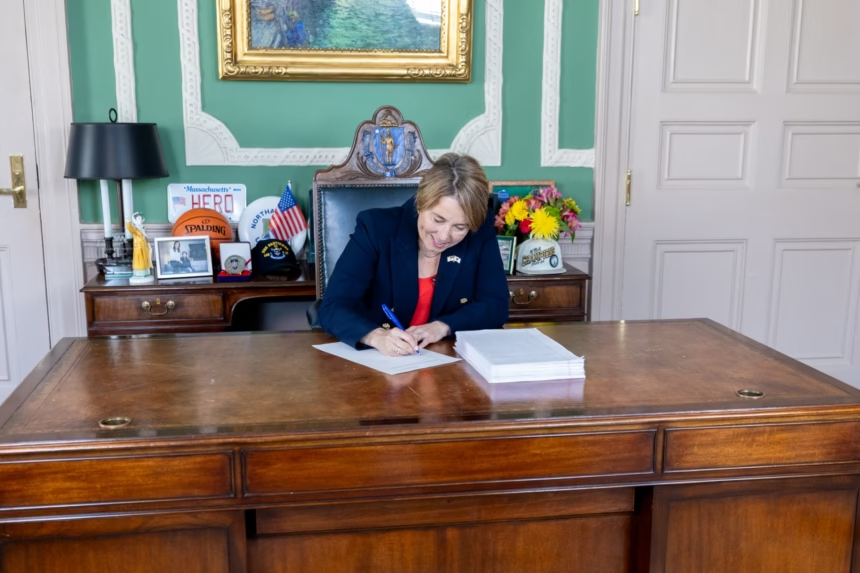Governor Maura Healey officially signed the Massachusetts state budget for the 2026 fiscal year on Thursday.
Totaling $60.9 billion, the spending plan is more modest than previous versions. It is over $1 billion less than the administration’s initial proposal (H1) and $130 million below the final version approved by the legislature, according to a statement from the Governor’s Office.
In a context of fiscal caution, the Governor also announced several austerity measures: a hiring freeze across the executive branch, the suspension of a planned pay raise for non-union managers in January, and the postponement of $125 million in local project funding pending a clearer view of their financial viability.
“I’m proud to sign a budget that protects what makes Massachusetts strong while remaining fiscally responsible,” said Governor Healey in a statement. She also denounced the situation in Washington, where “federal decisions could strip hundreds of thousands of residents of their health insurance.”
The FY2026 budget prioritizes cost-of-living relief for families: regional public transportation will be free, community colleges will remain tuition-free, universal free school meals will be maintained, and tenants will no longer be required to pay broker fees when signing a lease. The latter measure, introduced by Governor Healey herself, was confirmed through a dedicated section of the budget.
“This budget will save tenants thousands of dollars, make transportation more accessible, and improve the lives of working families,” said Lieutenant Governor Kim Driscoll.
Key Funding from the Fair Share Amendment
A cornerstone of the budget is the use of $2.4 billion in revenue from the Fair Share Amendment — a surtax on income over $1 million, approved by Massachusetts voters. This funding will support:
-
$1.5 billion for education, including $759.9 million for K–12, $266 million for higher education, and $85 million for MassGrant Plus scholarships
-
$469.2 million for early childhood programs, with $475 million invested in the C3 initiative for childcare providers
-
$711.9 million for transportation, including $550 million allocated to the Commonwealth Transportation Fund to support $5 billion in long-term investments
Projects funded include the MassEducate program, which aims to make community colleges fully free, and expanded access to reduced transit fares for low-income riders.
Strengthened Investments in Public Education
Massachusetts continues to invest in public education with a record $7.36 billion allocated through Chapter 70 — a 7% increase over FY2025. The minimum per-pupil spending rises to $150, marking a first for the state.
The budget also extends the Literacy Launch program with $15 million to improve reading instruction in early grades.
Additionally, $50.5 million will support high school transformation through initiatives like MyCAP, career pathways, and early college programs. Public higher education receives $1.64 billion, with an additional $28 million for tutoring and support services for the most vulnerable students.
Ongoing Commitment to Housing and Homelessness Prevention
Amid a housing crisis, $253.3 million will go to the Massachusetts Rental Voucher Program (MRVP), securing at least 10,000 housing subsidies for low-income renters. An additional $276 million will maintain emergency shelter capacity for homeless families. The budget also allocates $115 million to local housing authorities to manage public housing.
Health, Families, and Climate: Priorities Maintained
In human services, the state will invest $207 million to raise wages for service providers (Chapter 257), $35 million to expand Department of Children and Families (DCF) family resource centers, and $14.7 million to bolster maternal health care, including doula training.
A $5 million reserve is set aside to ensure access to abortion services in case of federal funding cuts, and $1 million is earmarked for a new Inclusive Health Care Fund.
On the environmental front, $557.7 million is allocated to the Executive Office of Energy and Environmental Affairs, including $20 million for clean energy tech through the Massachusetts Clean Energy Center, $6.2 million for environmental justice programs, and $15.6 million for hazardous waste remediation.
In her approval message, Governor Healey vetoed $130 million in spending, including $27.5 million for the Group Insurance Commission. She aims to curb rising costs tied to GLP-1 weight-loss drugs, allowing coverage only when medically necessary (e.g., for diabetes).
Alongside the budget, Governor Healey submitted a $100 million supplemental appropriation bill to provide the state with flexibility in responding to unforeseen federal decisions. The reserve could help, among other things, to expand the social work workforce.
“In the face of federal uncertainty, this budget proves it’s possible to be responsible without abandoning our people,” said House Speaker Ronald Mariano (D–Quincy), thanking Senate and administration partners.
Senate President Karen Spilka (D–Ashland) praised the budget as a “roadmap that protects the most vulnerable from the federal government’s cruel decisions” while allowing the state to “remain a leader in education and mental health.”







